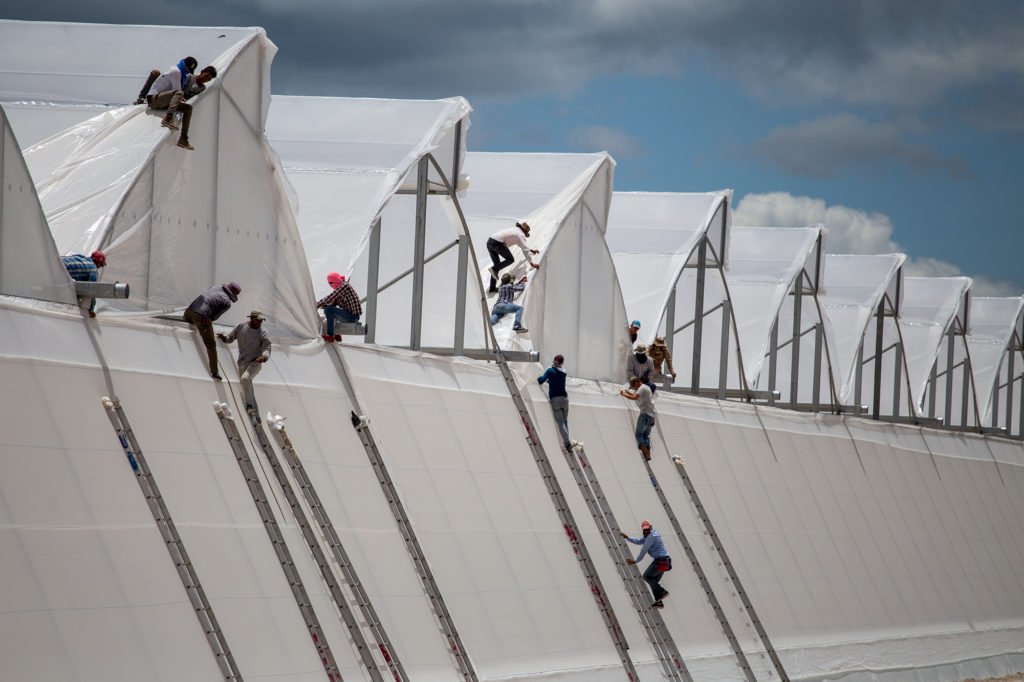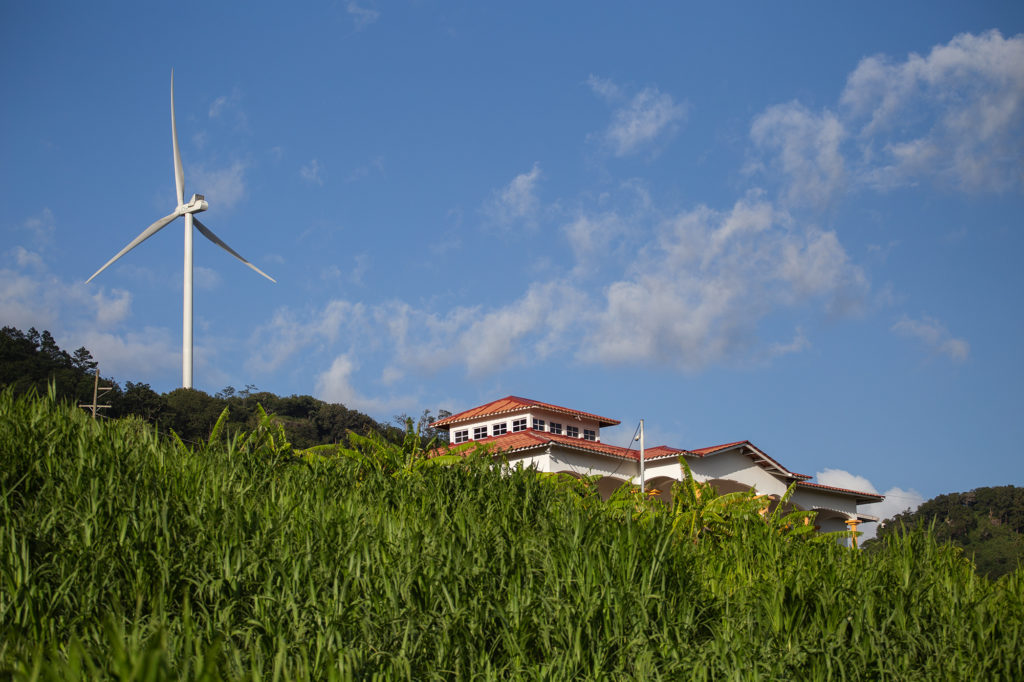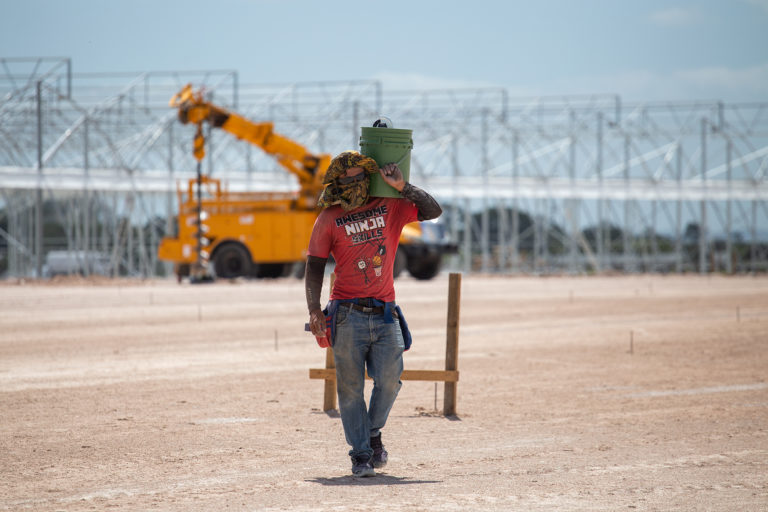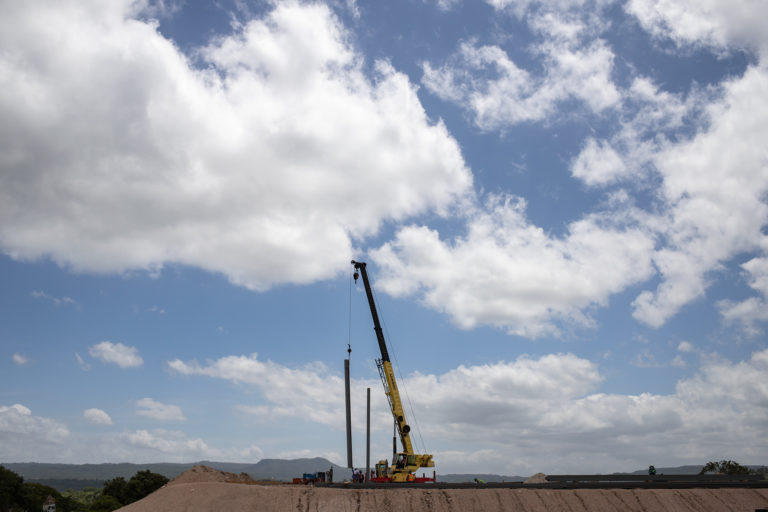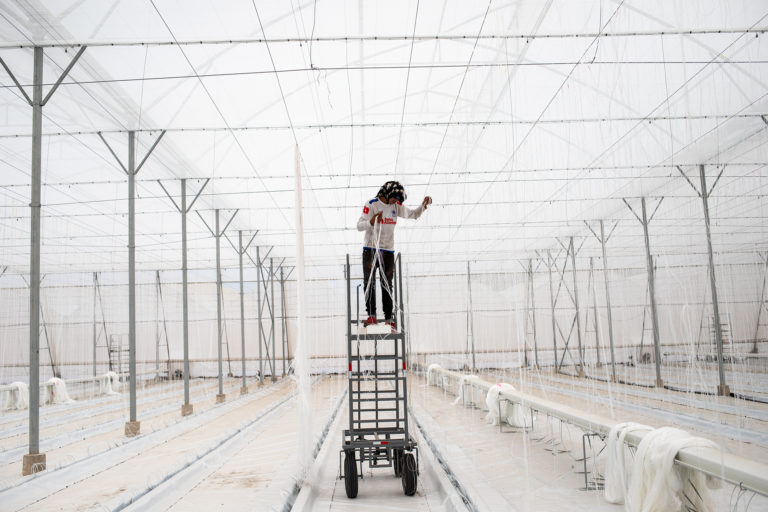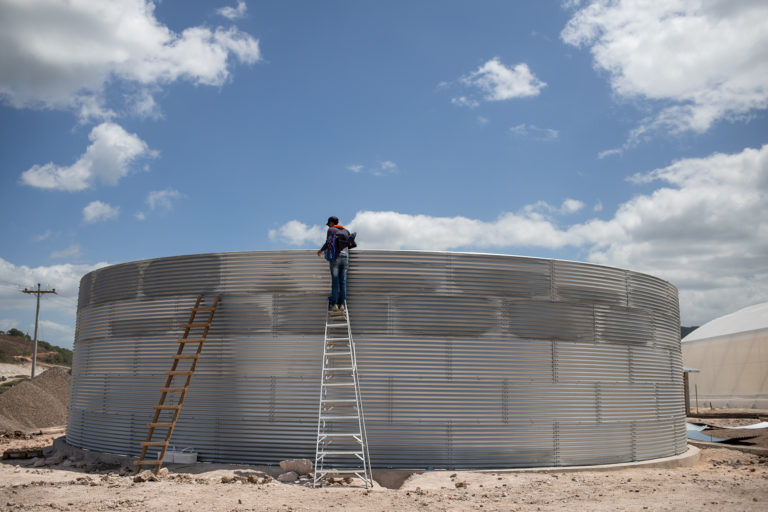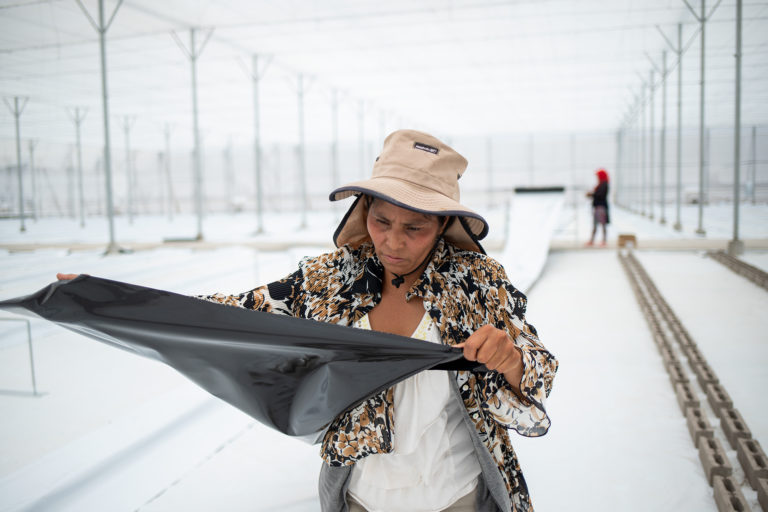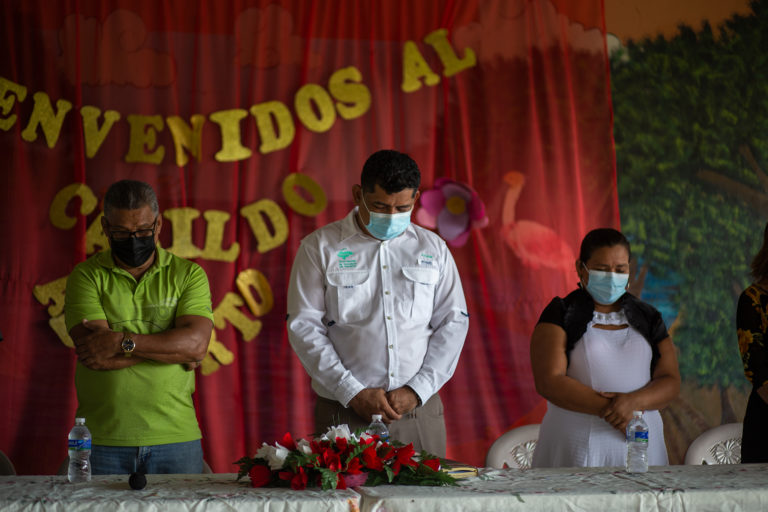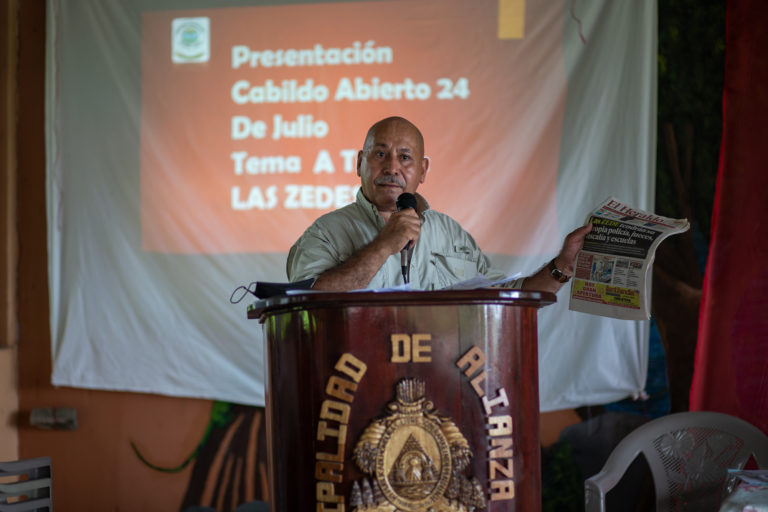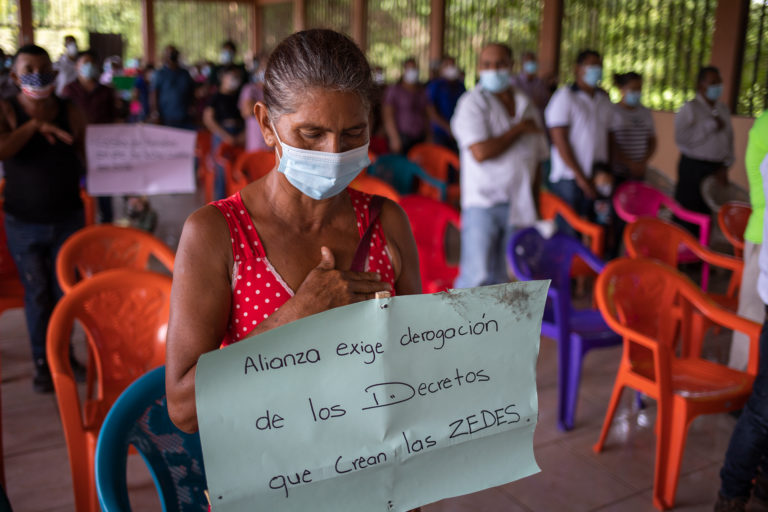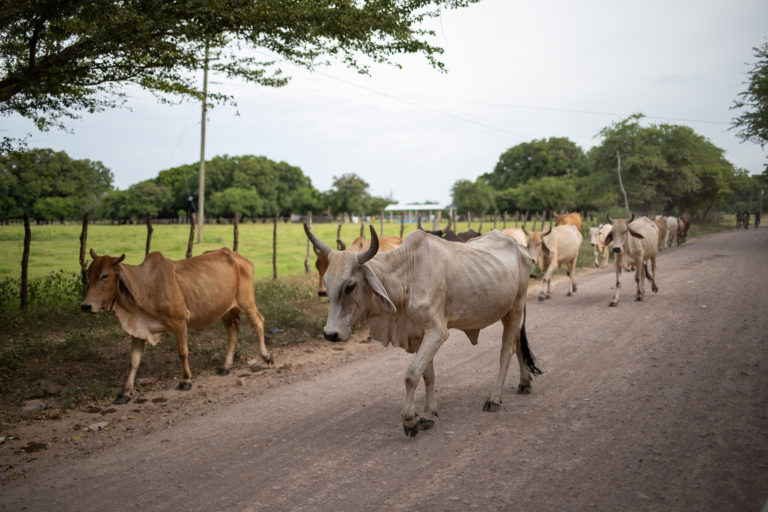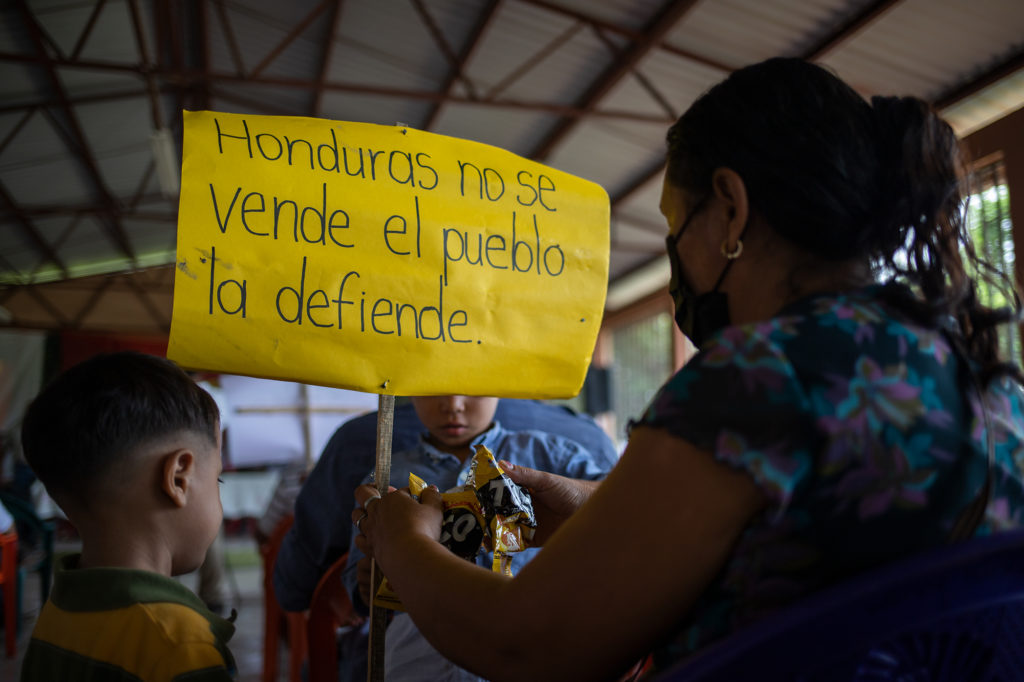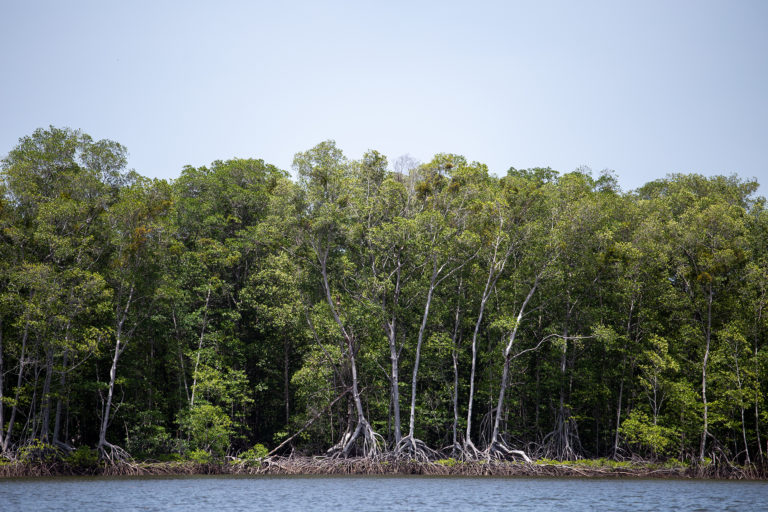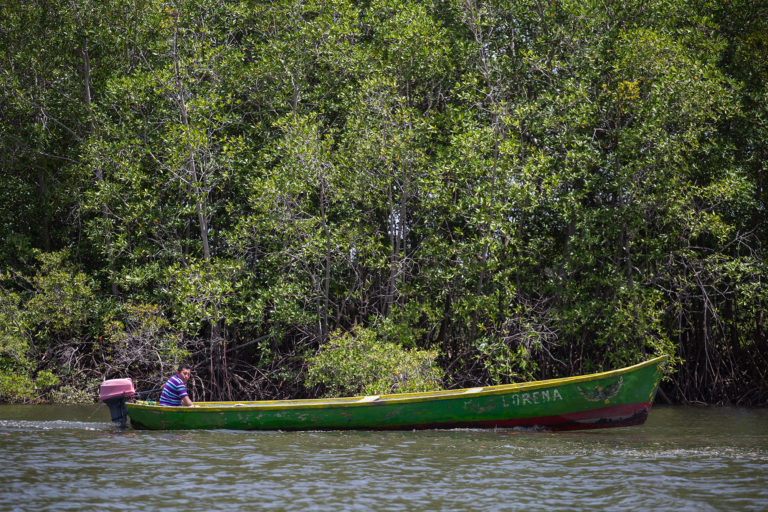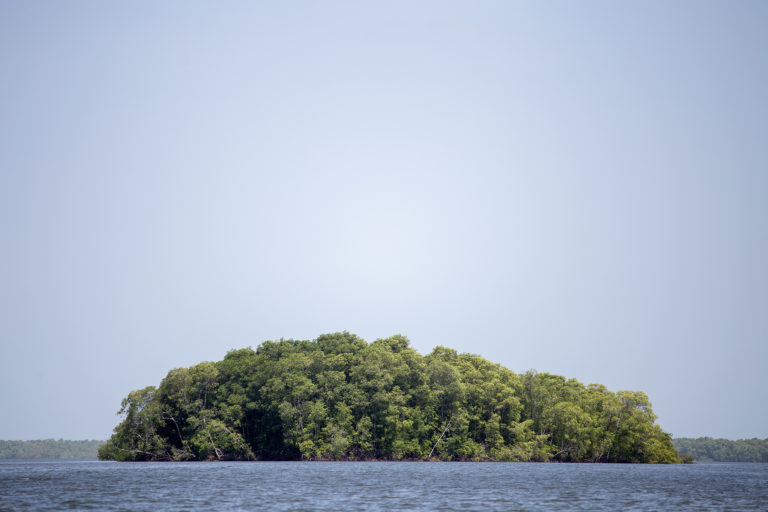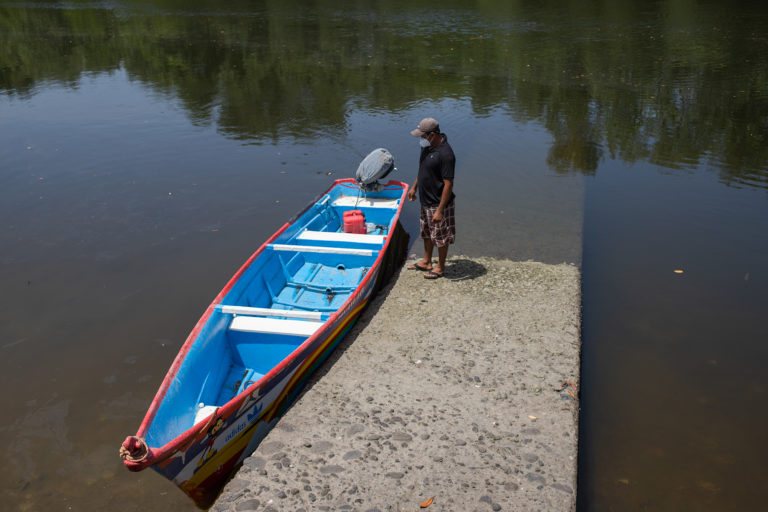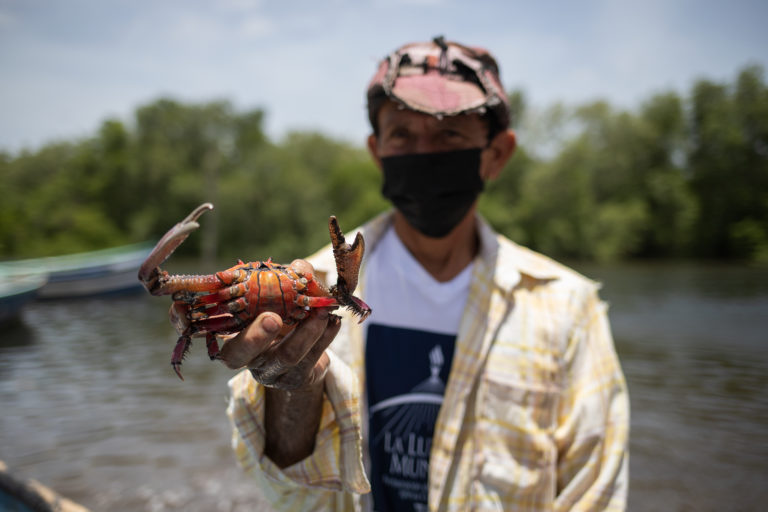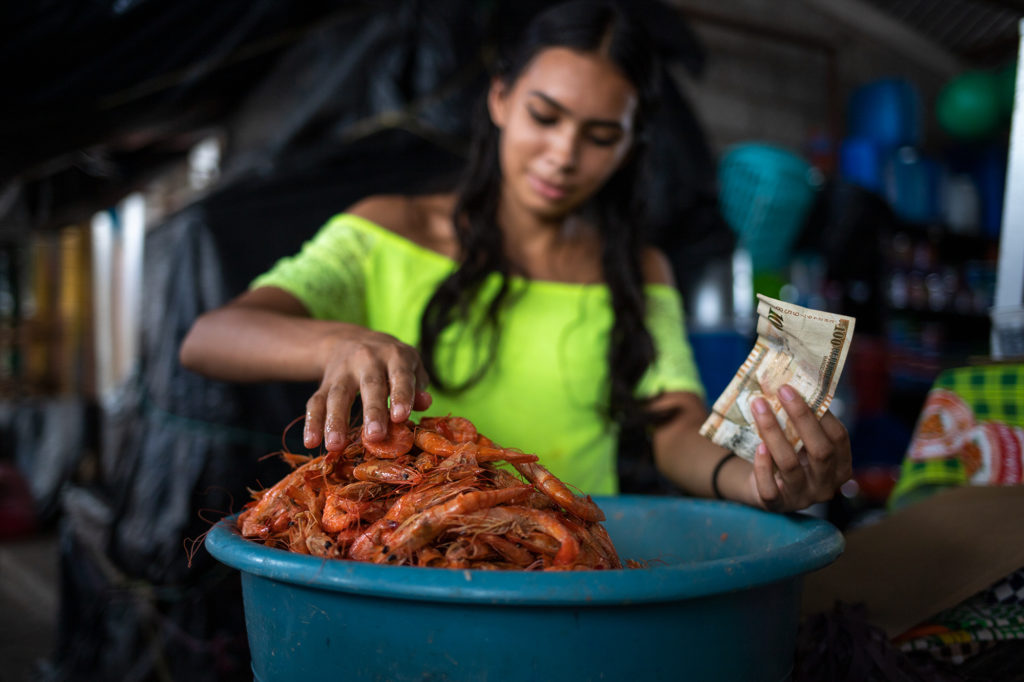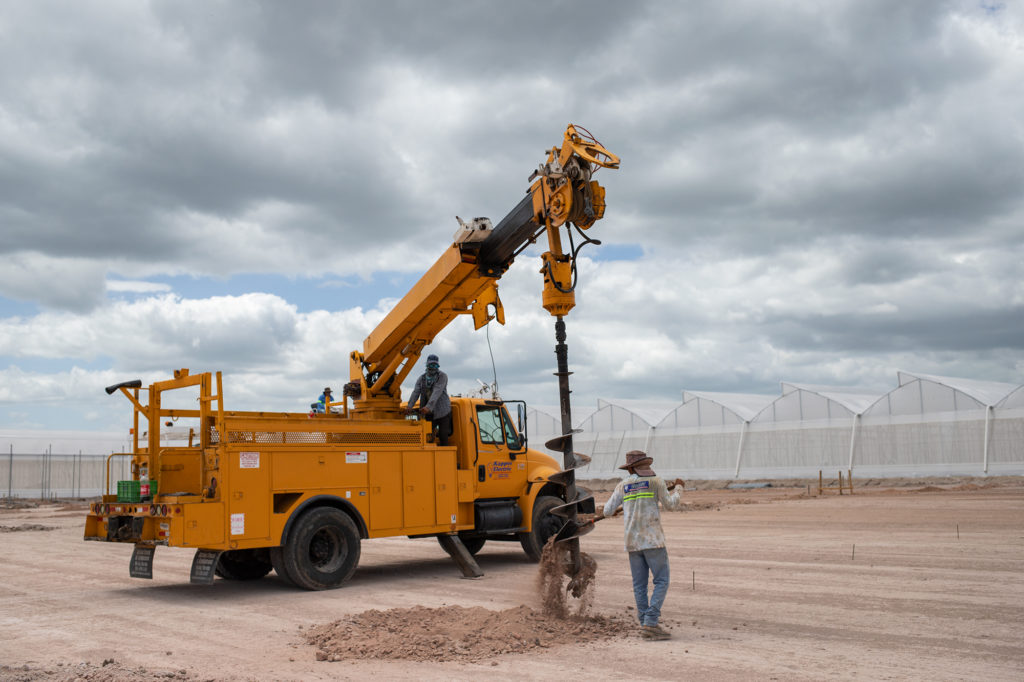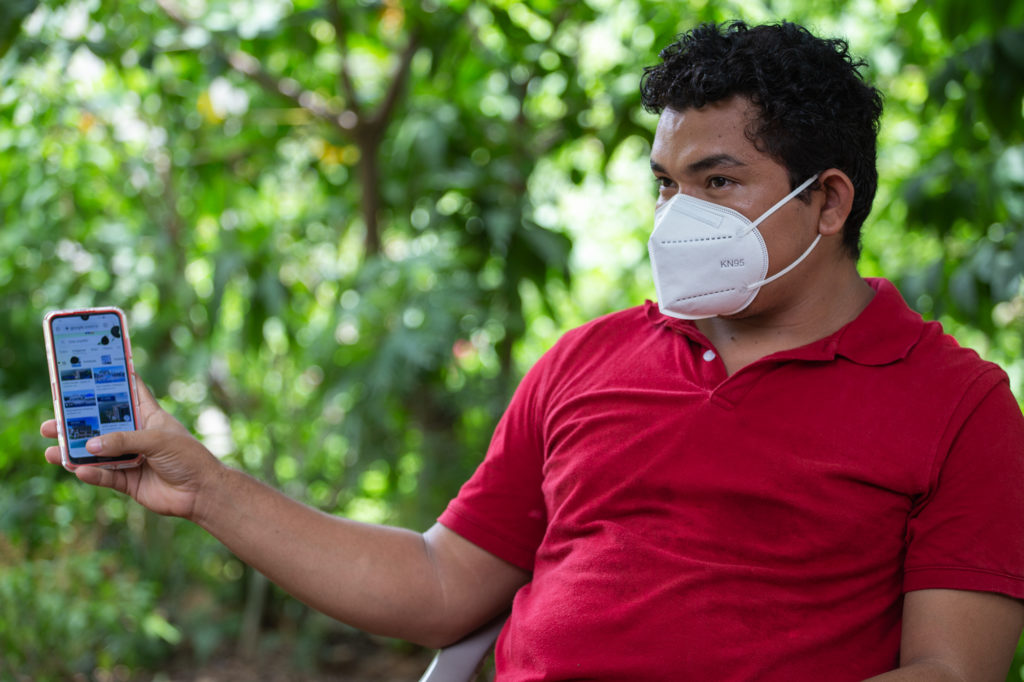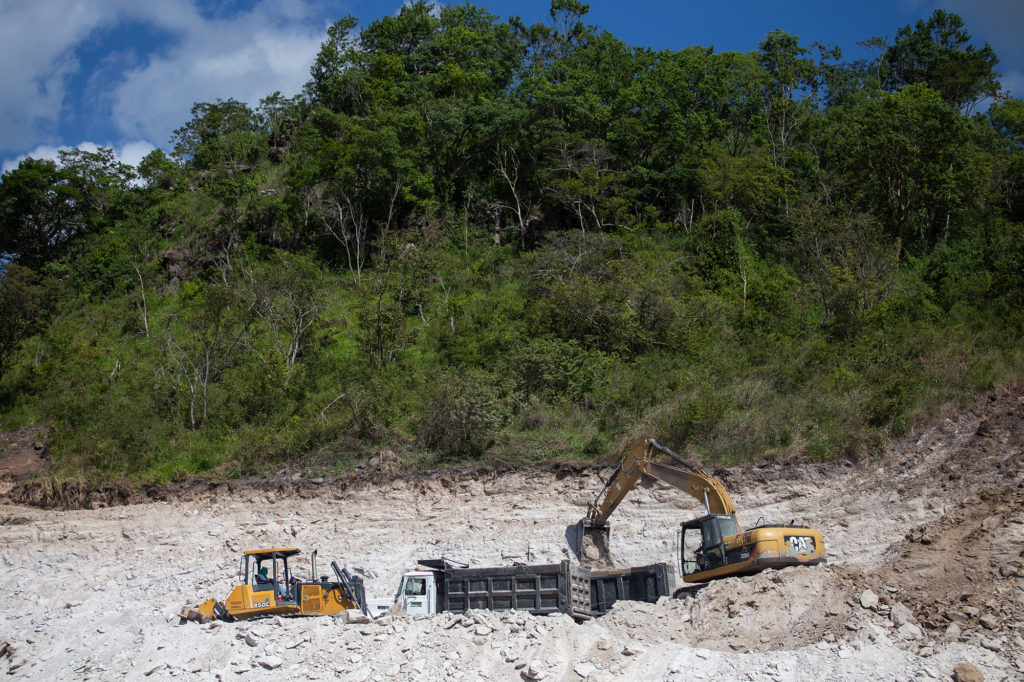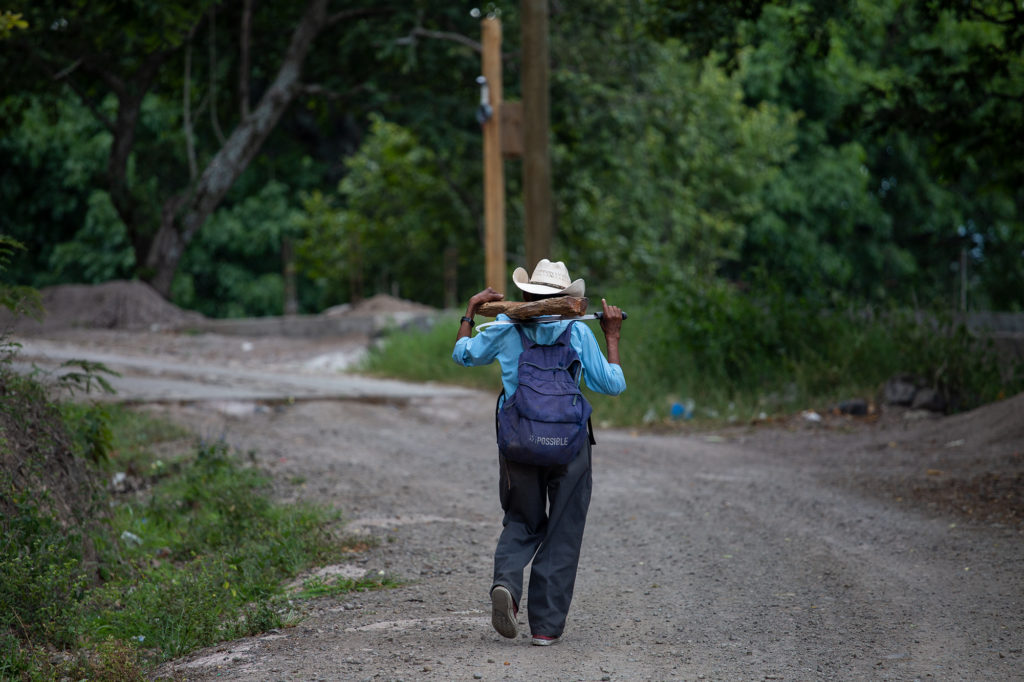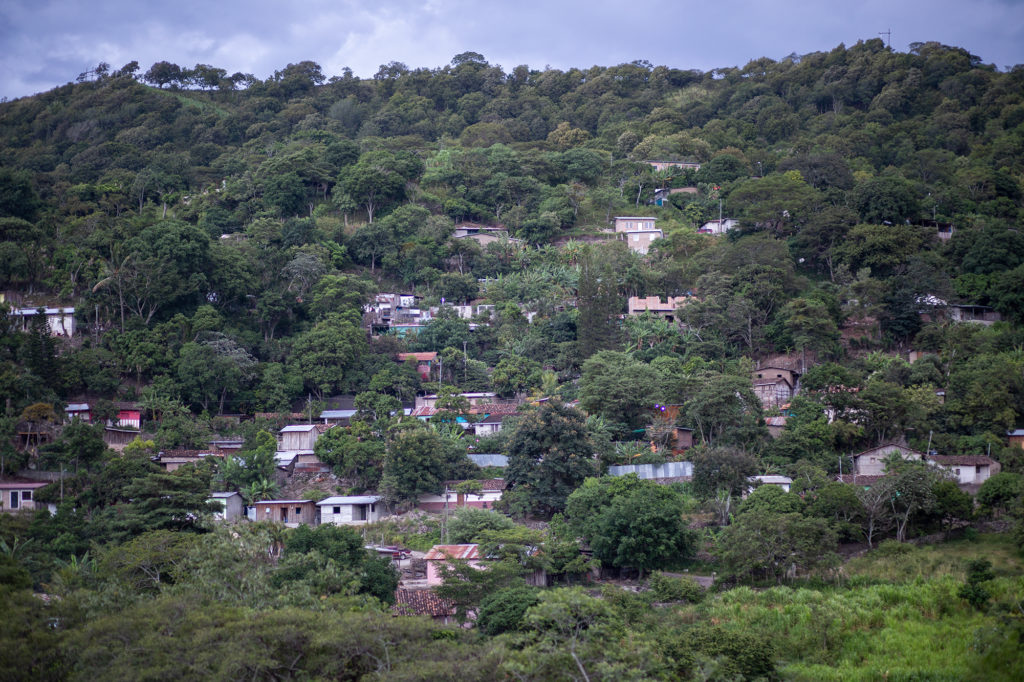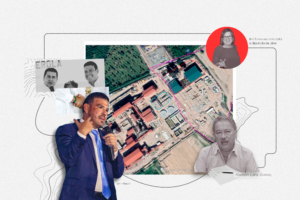In the midst of the pandemic and as the November elections approach, Employment and Economic Development Zones (Zonas de Empleo y Desarrollo Económico – ZEDE) continue to be a hot topic as they proliferate throughout the country. Despite increasing public opposition, the Honduran government continues to promote the policy.
By Lizz Raudales
Photos by Martin Calix
The development of the Orchid ZEDE is now underway in Las Tapias, a village near San Marcos de Colon in the southern Honduran department of Choluteca. Greenhouses for the cultivation of chili peppers and tomatoes for export to the United States are being erected in this special agroindustrial zone. Ricardo Lardizabal is a partner in the Orchid ZEDE and also in Agro Alpha, the company that will operate in the ZEDE. In an interview with Contracorriente, Lardizabal said that for now, this will be the only company in the ZEDE, since to establish more companies there, “one has to be alert to what other entrepreneurs are doing.”
San Marcos de Colon is known as the “Oasis of the South.” This municipality near the Nicaraguan border ecompasses 18 villages and hamlets, as well as 41 neighborhoods. Located 192 kilometers from Tegucigalpa’s Central District, its economy is based on subsistence and commercial agriculture and livestock. In 2017, the United Nations Educational, Scientific and Cultural Organization (UNESCO), designated the municipality a biosphere reserve due to the biological diversity of its flora and fauna.
Construction of this new ZEDE began in January. Over the past eight months, more than 350 workers with domestic and foreign contractors, as well as from Agro Alpha have built greenhouses and irrigation systems. Construction is also underway on common areas such as a cafeteria, bathrooms, and rainwater collection facilities.
Lardizabal told us how his partner, Víctor Wilson Canessa, one day said, “Let’s buy the ZEDE.” Wilson was referring to the ZEDE initiated by his friend, Mort Taylor, a US lawyer who had decided to discontinue the project. Lardizabal replied, “If you think we can make it work, let’s give it a go.” The two friends then entered into a partnership to buy the ZEDE and make it a reality.
Wilson is the general manager of Grupo Granjas Marinas, a Pacific white shrimp farm in southern Honduras. Lardizabal says that business interests brought them together many years ago, and they partnered on other projects before working together to develop Agro Alpha and the Orchid ZEDE.
Mort Taylor is an attorney from Alabama who works in the power generation industry. Lardizabal describes how he and Wilson came to own the Orchid ZEDE, “A few years ago, during all the turmoil in the energy industry here, he was considering the development of coal-fired power plants in Santa Barbara and created a ZEDE for this project.” Taylor’s project stalled when he realized that the main challenge was not getting it off the ground, but rather the number of people hoping to profit from his ZEDE. Wilson and Lardizabal paid Taylor US$200,000 for the rights to develop the ZEDE.
Listen to our podcast (in Spanish): ZEDEs in Honduras: third time’s the charm
Regarding the land where the ZEDE is situated, Lardizabal said, “What saved us was that there were no people living on the land and we bought it all from a single owner.” The previous owner is a family friend of Lardizabal called Changel.
With more than 25 years experience in the cultivation of sweet corn, sweet chili peppers, tomatoes and other produce, Lardizabal knows the local and export markets well. Victor Wilson, on the other hand, is well versed in the various mechanisms in Honduras for developing special industrial zones, such as the ZOLI free trade zone and the ZIP Industrial Processing Zones for Export. When Wilson informed him that there was a two to four year timeframe for developing a project under the Temporary Import Regime (Régimen de Importación Temporal – RIT) or any other special regime, Lardizabal felt that their U.S. clients would not wait that long. That’s when they decided to start the ZEDE.
Lardizabal says that the ZEDE regime will enable them to produce better quality vegetables in greater quantities because the tax exemption reduces their expenses.
Public opposition in southern Honduras
“For us, ZEDE means to cede, to cede what belongs to us,” says Faustino Manzanares. Manzanares is the mayor of Alianza in the southern Honduran department of Valle, about 130 kilometers from the Orchid ZEDE. The mayor recently presided over a town hall meeting that declared Alianza “ZEDE-free” after two hours of public debate. Years ago, when the Korea International Cooperation Agency (KOICA) expressed interest in developing the first ZEDE megaproject in Honduras, Alianza was the first municipality to get on board with the idea.
Back in 2014, the mayor of the small town, a place often neglected by the central government in Tegucigalpa, traveled to South Korea to get a vision of what his municipality could become. Six years later, that dream was never fulfilled. Manzanares, who is seeking reelection in November, now tells his constituents that he knows they oppose the ZEDE law.
“It’s a potential threat because the law allows for expropriation. But it could benefit the public, it could be good for us all and improve our living conditions,” said the mayor, who will seek re-election in November.
Several municipalities have held town hall meetings to declare themselves ZEDE-free, and have collected signatures on petitions to repeal the ZEDE law.
Attorney and human rights defender Oscar Hendrix, says that the town hall meetings have seen a great deal of public outcry since April when “social media and news outlets broke the news of plans to add Puerto Satuyé, about 300 acres of land to the Prosperous ZEDE,” – referring to the ZEDE under construction in Roatán and La Ceiba.
However, it’s not clear how decisions made in town hall meetings impact the law. “As a proponent of democracy, I say yes [they are binding], but in Honduras they don’t care,” said Hendrix. Russel Garay, an attorney and public policy expert, says that these town hall meetings are just a mechanism for obtaining public input, since municipalities are the only entities that have the authority to create local regulatory instruments.
The evolution of the ZEDEs
The municipalities of Amapala, Nacaome, and Alianza had been chosen as the initial sites for the country’s first ZEDE. The Hernandez administration and KOICA declared that the ZEDE would generate 100,000 jobs and foster economic development in southern Honduras. Feasibility studies were proposed to further the government’s vision of turning the area into the next Singapore.
The KOICA plan that was presented to the Honduran government proposed creating a logistics hub in Alianza for exporters and importers. An innovative agricultural research and development center was envisioned for Nacaome. The largest project would be developed in Amapala ⎼ a mega-seaport for shipping goods and a bridge connecting the island with the mainland. The Korean embassy in Honduras issued statements indicating that everything was going smoothly and that the construction would begin in December 2017, but this never happened.
Read El Faro’s report (in Spanish): Honduras’ libertarian experiment in the Gulf of Fonseca
Life in these three municipalities hasn’t changed much since the South Korean investors conducted feasibility studies to develop the promised megaprojects. People here continue to depend on fishing, agriculture, livestock and foreign remittances.
Oscar Ferrufino lives in the village of La Brea, in Nacaome municipality. It’s a fishing community located near Chismuyo Bay, with mangrove forests that shelter fish, crabs, shrimp, and the small, black clams known as curiles. Ferrufino says that 10-12 fishing boats set out from La Brea every day to bring in seafood that they can sell to brokers or individuals. He says that he catches an average of 50-60 pounds per day. “People who stay out longer catch 100-150 pounds per day,” he says. The fish go for US$0.75-1.00 a pound, while crabs go for US$0.25-0.30 a pound.
“Crabbers like me have absolutely no support from anyone. We live on whatever we can earn. It would be good to get some help; not just for me, but for all of us,” said Juan Angel Arias, who has earned a living catching crabs for more than half his life. When asked if people in La Brea know about the ZEDE, Arias said that nobody is talking about it. They have only heard about it in the news, so he didn’t want to say much. But Arias did say that any help for the fishers is welcome.
Amapala’s situation is different, says Alan Torrez, a resident of La Flor and secretary of the board of directors of the Association for the Development of the Zacate Grande Peninsula (Asociación para el Desarrollo de la Península de Zacate Grande – ADEZPA). Torrez says that ADEZPA has been raising awareness and protesting against the ZEDEs since 2013, “We held community meetings to explain the ZEDEs. We also showed videos of what the ZEDE in Amapala was going to look like, since we were one of the first Honduran municipalities selected for ZEDE development.”
The young man told us about a meeting in Siguatepeque (Comayagua department) in which an economist named Fernando García spoke about a feasibility study that was conducted for southern Honduras. But no foreign investors were interested in the project. Torrez says that the Prosperous Honduras ZEDE in Roatan took them by surprise, since they thought that the first ZEDE was supposed to be in southern Honduras.
Read: A Micronation for Sale in Roatan
Lingering fears of expropriation
“We’ve heard it all ⎼ that the ZEDE is a separate country with its own currency and laws,” laughs Ricardo Lardizabal, saying he has his hands full just trying to comply with the strict regulations for developing the ZEDE and exporting its produce, such as requirements for refrigeration or the packaging of the chili peppers. Lardizabal stressed that they are not interested right now in expanding the Orchid ZEDE, although a neighboring property owner has offered to sell them land. Lardizabal and Wilson instead proposed that she join the company, since she has a degree in horticulture.
Several media outlets recently reported that Agro Alpha had delivered some sort of ultimatum to the residents of the neighboring villages of Las Tejas and Las Tapias demanding that they sell their properties to the ZEDE.
“We’re not going to sell. There are 300 of us living in 60 homes here, and we will defend our property. We’ve worked hard for what we have and will only leave when we’re dead,” said Ignacio Davila to a reporter. There are also complaints that the Orchid ZEDE was hiring foreigners and not local residents.
The Orchid ZEDE recently issued a statement signed by Guillermo Peña Panting, the ZEDE’s technical secretary, and owner Víctor Wilson Canessa, that says, “The developers of the Orchid Employment and Economic Development Zone categorically deny that there is any intention, request, or communication of any kind to dispossess or expropriate land or houses belonging to the residents of Las Tapias. No official or unofficial notification has been issued by the Orchid ZEDE’s management on this issue.” The statement also denies that legal proceedings have been initiated to evict the residents of the surrounding areas or from any San Marcos de Colon community.
Contracorriente contacted Vilma Ordoñez, a Liberal Party member of the San Marcos de Colon municipal council, who confirmed that expropriation is not an issue right now. However, she says that the fear of expropriation lurks in the background because the ZEDE law allows it.
“The [Orchid ZEDE] has not tried to buy their properties or to evict them. This is misinformation,” said Ordoñez. She believes that the real issue is the special privileges granted to ZEDEs. She also noted that Agro Alpha managers met with residents of Las Tapias to resolve any misunderstandings.
Read (in Spanish): The secrecy surrounding ZEDEs in Honduras
Lardizabal recently sent a statement to Contracorriente describing a meeting with the Las Tejas village council to present Agro Alpha’s plans, “I asked some of the 55 people from Las Tejas who work at Agro Alpha to arrange a meeting with the village council and other members of the community. We explained our plans and our desire to improve the area. The people seemed to be reassured by the discussion. Luckily, just as we were leaving for the meeting, three people from the National Human Rights Commission [Comisionado Nacional de los Derechos Humanos – CONADEH] showed up and wanted to talk to someone in charge about the media reports. I asked them to accompany me to the meeting and they also came away reassured.”
In an interview with Contracorriente, Lety Matamoros, a resident of the La Benita neighborhood, said that she and several residents from three neighborhoods near the Orchid ZEDE recently met with Lardizabal when he delivered street paving materials to them.
“He was very amenable and assured us that the company would never expropriate any land,” said Matamoros. Noting that 30 women from Las Tapias currently work in the Orchid ZEDE, some women from La Benita asked Lardizabal for jobs and he agreed. Matamoros says that she sees no reason to shut down Agro Alpha if the company is creating jobs.
ADEZPA’s Alan Torrez believes that the Orchid ZEDE will expand in southern Honduras by buying or expropriating land, pointing to the expansion of Roatan’s Prosperous Honduras ZEDE to encompass the Port of Satuye in La Ceiba. He also mentions that there are rumors of two new ZEDEs to be built on the islands of Isla del Tigre and Zacate Grande in the Gulf of Fonseca, because foreigners and government officials have been spotted in Amapala conducting land and marine surveys. “We are not opposed to development, but we want inclusive development, with participation from communities and organizations,” said Torrez.
Tax exemptions
In May, the National Congress determined that the last paragraph of Article 6 of the Sales Tax Law exempts ZEDEs from paying the 15% tax, reasoning that that since the free trade zone law’s exemptions from customs duties apply to ZEDEs, they do not have to declare taxes and the Foreign Currency Income Law does not apply to them. These ZEDE benefits do not apply to other domestic and foreign companies operating in Honduras. Approved in the same congressional session, the Law for the Implementation and Operation of the Employment and Economic Development Zones regulates ZEDE tax obligations and domestic purchases.
The new law states, “The third paragraph of Article 32 of the Law of the Employment and Economic Development Zones (ZEDE) indicates a zero tax rate for the domestic purchase or acquisition of inputs, goods or services that are incorporated or used in the production of goods or services exported by Employment and Economic Development Zones (ZEDE), when the producer is the exporter itself or when the good or service is produced or rendered by a third party that is an essential part of the value chain of the goods or services exported by the Employment and Economic Development Zones (ZEDE).”
Contracorriente asked Vilma Ordoñez of the San Marcos de Colon municipal council whether the Orchid ZEDE has paid any municipal taxes, as asserted by Guillermo Peña and Ricardo Lardizabal. Ordoñez confirmed that the municipal council secretary reported in a recent meeting that Agro Alpha paid a little over US$20,000 in taxes and operating permits. Lardizabal said that while he agrees with the tax exemption provided by the ZEDE law, he will keep paying municipal taxes since one of the objectives of the Orchid ZEDE is to stimulate economic development in the municipality of San Marcos de Colon.
Ordoñez said that she personally opposes the ZEDEs, as do other municipal council members from the Liberty and Refoundation Party (Libre). She has asked the mayor to publicly oppose this type of project, but was not heeded. She believes that a town hall meeting should be convened so that the public can determine the future of the municipality. Ordoñez acknowledges that the “jobs are a blessing, but the real problem is the special privileges granted to the ZEDEs.”
The Orchid ZEDE currently employs about 350 people from San Marcos de Colon and other areas. Isaias Carranza is originally from Comayagua, but was brought to the ZEDE by one of the contractors building the greenhouses. He has been working there on various structures since the ZEDE started up in January. “We have no issues with them [Orchid],” said Carranza when asked what he thinks about Agro Alpha’s work and future plans.
Richard Ordoñez lives in the San José neighborhood of San Marcos de Colon and says that he has been working under Lardizabal for five months. Ordoñez told us that they pay better than any other job he could get in the area, and that local businesses have benefited because people can buy more with better wages.
But not every business in San Marcos de Colon has benefited from the ZEDE’s presence. Martha Ondina Alvarado runs a small diner and says that she doesn’t exactly understand what a ZEDE is. She does know that it’s a large project for producing chili peppers. Alvarado says that her business hasn’t improved at all after reopening after the pandemic quarantine, even though the Orchid ZEDE pays better than other companies.
Despite the government’s claims that the ZEDEs will benefit the country, doubts remain about the tax exemptions and other privileges granted to the ZEDEs. Attorney Russel Garay acknowledges that tax-exempt enterprises can benefit a country, but not in the way most people think, “Enterprises that don’t pay taxes could produce some benefits. For example, when a certain technology is needed that cannot be acquired domestically, and the government signs an agreement with a company to provide and manage that technology for a number of years.”
Garay points to an example in the hydrocarbon industry, “A company installs machinery [obtained abroad] and profits from it for a specified period. Then it turns over the machinery for the government to manage. Such a model could benefit Honduras.” However, the license to operate a ZEDE does not have an expiration date, so a ZEDE can’t serve a public purpose, only a corporate one.
Meanwhile, the Orchid ZEDE, with its kilometers of greenhouses for growing export-quality produce, promises to stimulate economic development in a city that is only two hours away from the municipalities that, according to South Korea and the Honduran government, could have been the site of Central America’s greatest technological and logistical achievement. In 2014, when feasibility studies were just getting underway, their dream was to become the next Busan or Singapore. Now, these same municipalities are opposing the special zones that had promised so much six years ago.

